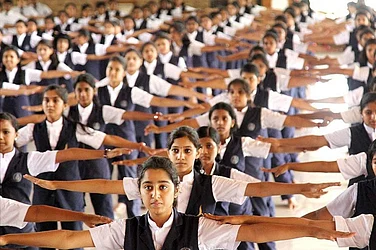Prakash Minj, the Central President of the All India Tribal General Assembly, has been fighting a long battle for the Forest Rights Act (FRA) from the Garwa district of Jharkhand. Many villages of the district had put up sign boards over more than a thousand acres of forest land after holding meetings at Gram Sabha in the month of February, last year. Minj had then said, “We have been raising our voices for the last three years. The claim sheet we had filed for community forest land, that land should be leased out to us. Out of compulsion, we took a decision in the Gram Sabha meeting that we would put up signboards on those many acres of land on which we are claiming our rights. On February 2, we erected signboards in three villages. The administration had then stopped us and prohibited us from further putting up the sign boards. We were assured that we would soon be receiving the forest land on lease.”
Minj now tells Outlook, “More than a year has passed but we have yet to receive the forest lease. A massive campaign of erecting sign boards across Jharkhand will be carried out after the sowing of paddy in the fields. The forest land is not being leased out to the tribals of the state. The Forest Rights Act gives us the right to get the forest land on lease. The government is delaying in providing us with the lease. Gram Sabha has given us the power to erect sign boards on forest land (that belongs to us) in order to demarcate the boundary.”
According to a joint survey conducted by the Indian School of Business (ISB) and Jharkhand Forest Rights Forum, out of 32,112 villages in the state, 14,850 villages are close to forest areas. In these areas, through Forest Rights Act, there ought to be claims by individuals and communities on 18,82,429.02 hectares of forest land. Save the Jharkhand Forest movement believes that more than a crore people in Jharkhand are directly or indirectly dependent on forests. However, only 63 thousand hectares of forest land have been leased out.
The issue of forest rights has been very significant for the tribals of Jharkhand for the last five years. There is a new debate on the Forest Rights Act and the powers of the Gram Sabha about which Prakash Minj is talking about. The discussion centres around the controversial Forest Conservation and Amendment Bill, 2023. The bill has been passed by Parliament during its Monsoon Session without a proper discussion and debate. This bill has been termed as anti-tribal by many state governments, leaders and activists. This bill will end the powers of both the Gram Sabha and the Forest Rights Act.
According to CPI(M), this amendment completely violates laws relating to Gram Sabha and Forest Rights Act. Politburo member of CPI (M) and a member of the Forest Rights Select Committee, Brinda Karat, spoke to Outlook on this issue. She said, “Forest Conservation Act 1980 talks about the protection of forests. However, the law being introduced through this new amendment talks about the exemption. This means that there will be exemptions on grounds of national security and the development of forest land. This will wipe out the laws relating to Gram Sabha and Forest Rights. The land which belongs to the tribals and acts as their means of livelihood will be snatched away through this law.”
On World Tribals Day, Tribal Rights National Forum, a wing of CPI(M), is set to launch a countrywide movement to protect the rights of forest tribals and protest against the Bill. Brinda Karat says that along with the Forum, there are many tribals and tribal organisations who will take to the streets and protest against the bill.
The Jharkhand government has also protested against this bill. After a long-pending demand, the Jharkhand government last month prepared draft rules for implementing the Provisions of the Panchayats (PESA) law. PESA law will be implemented to recognise the rights of tribals. However, the erstwhile member of the Jharkhand Tribal Advisory Council (TAC), Ratan Tirkey says that due to the Central Government’s Forest Conservation and Amendment Bill 2023, the rights given to tribals and Gram Sabhas provided under PESA law will cease.
Ratan Tirkey says, “This law is totally against tribals. The tribals of Jharkhand will be badly affected by this Bill. Firstly, with great difficulty, the rules of PESA have been formed. Before Gram Sabha and our traditional system could have been empowered through PESA, the Central Government wants to end these powers by introducing Forest (Conservation) Amendment Bill, 2023. It appears that this is being done as part of some conspiracy. This law of the Centre will take away the forest land of tribals under the pretext of strategic projects for national security, national interest and defence. The Centre will get the rights to directly transfer the forest land to private companies, the likes of Adani and Ambani. This law neither mentions seeking permission from Gram Sabha nor talks about Forest Rights Act. These two identities of the tribals will be erased. Also, no clearance will be sought on the social and environmental assessment impact before taking possession of the forest land.”
Ratan Tirkey has informed that many tribal organizations of the state along with many organizations across the country are planning to meet the Governor and the President. He also says that they will submit an objection letter to the President against the bill, asking for it to be stopped from being enacted into law.
State Coordinator of Save the Jharkhand Forest movement, Zavier Kujur, says that Central Government’s Forest (Conservation) Amendment Bill, 2023 will adversely affect the provisions mentioned in Forest Rights Act and PESA with regard to Gram Sabha. This will increase the dominance of corporate giants and markets on the tribal forest land.
Zavier Kujur says, “As far as my understanding goes, the plantation drive that was being carried out by the forest department under CAMPA Act or Compensatory Afforestation Fund Act will be handed over to private companies. This plantation drive will be a business now. Gradually, not only the forest land but community forest land, revenue land, private land and vacant land in the villages will be sold to these private companies for plantation. The state government will not have any say on this issue. The provisions regarding seeking permission from the state government have been done away with. Also, the rights bestowed on the tribals of the ten states by the fifth schedule of the Constitution and PESA laws will come to an end. At least, the governments of the states covered under the fifth schedule should demand rights of the tribals and reforms in accordance with PESA and the fifth schedule.”
The land that is being mentioned by Zavier Kujur is considered as deemed forest (physical parcels that look to be forested but aren’t listed as such in historical or official records). Tushar, who has been doing research on forest laws, says, “The Bill of the Central Government that talks about keeping away land from forest clearance, contains a big chunk of deemed forest. As per the Forest Rights Act of 2006, the tribals and aboriginals have rights on this deemed forest. Forest Rights Act says that all types of forest land will be governed by the Forest Rights Act. This clearly indicates that Gram Sabha and the tribal community will have rights on that piece of land. However, when these forest lands have been kept away from the clearance of the Centre’s amended Bill, the Government will not be obliged to seek any permission from Gram Sabha for the same. This means that Gram Sabha and Land Rights Act do not hold any importance. When these are not present, the existence of tribals will be in crisis.”
(Translated by Kaveri Mishra)



























